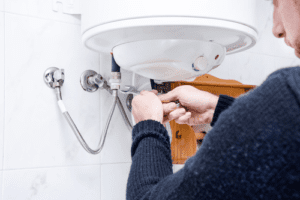The more you understand about your HVAC system, the more value you will be able to wring from it. For that reason, it is recommended that you learn as much as you can about the various parts of your HVAC and how they work in concert with one another. Many homeowners understand the basic functions of their filters and ducts. A few of them even have solid knowledge of more complex parts such as compressors and evaporator coils. However, many people who own HVAC systems do not know how one of the most important parts of the entire apparatus functions: their water heater. If you’ve ever wondered to yourself: “how do water heaters work?”, then we’re about to help you. Keep reading and learn everything you ever wanted to know about this vital part of your HVAC.
How do Water Heaters Work? Here are the Basics:

We all know what the purpose of a water heater is: it heats the water in your home so that you can use it to bathe, wash dishes, do laundry and perform other tasks that require hot water instead of cold. However, that’s where the expertise most people have with water heaters ends. Did you know that there are several types of popular water heaters available? You do now, so here they are:
- Tank Water Heaters: these heaters are the kind most commonly found in homes throughout the United States. How do you know if you have a tank-type water heater? It’s easy: just look for a tank. If your home doesn’t have a water tank near the HVAC, you probably don’t have a tank water heater. A tank heater holds a substantial quantity of water and keeps it heated in case you ever need to use it. The tank it uses is typically made from steel, with a glass lining on the inside that helps prevent the steel from becoming corroded over time. Since corrosion can eventually lead to leaks that require replacement of the entire tank, it’s essential to take excellent care of your water heater and have it checked by a professional whenever you call one to conduct routine maintenance on your HVAC. There are two different subcategories of tank-type water heaters: electric and fuel-fired. Let’s take a closer look at each one of them.
- Electric Tank Water Heaters: these heaters work by using electrical resistance heating elements to heat the water inside the tank. These elements are connected to the thermostat so that you can control the temperature of the water in the tank. Adjusting the thermostat results in the system either opening or closing the circuit that allows current to flow into the elements.
- Fuel-fired Water Heaters: fuel-fired water heaters operate on very similar principles to their electric cousins. In these systems, however, the thermostat is connected to a control valve that allows gas to be fed to a burner. In turn, the burner warms the water in the tank when gas is being fed to it. These systems cause more wear and tear than electric tank-type heaters, which means that they do not typically last as long. However, proper maintenance can ensure that your fuel-fired water heater lasts for many years and delivers efficient performance throughout.
Tank water heating systems are common and can be maintained easily enough by investing in regular professional help. However, it is important not to neglect your tank for several reasons. Corrosion is only one of the risks that come with owning a poorly-maintained tank water heater. In rare cases, it may also be possible for fuel-fired systems to cause explosions if there is a gas leak near the burner flame. Avoid this hazard by having your HVAC technician check both your gas line and the burner in your hot water tank whenever they are at your house to perform maintenance.
- On-Demand Water Heaters: on-demand water heaters differ from both types of tank water heaters in that they do not store heated water in preparation for use. Instead, they heat water only when hot water is required, making them much more energy efficient than most tank-type models. On-demand water heaters are (understandably) more expensive at the point of purchase, but they can offset their initial price by providing energy savings over time.
How Do Water Heaters Work? Now You Know
At this point, you should have a much more thorough understanding of the different water heaters that exist for use in homes such as yours—and you’ll probably make sure to take excellent care of the heater in your home. Whether you’re sticking to a tank-type system or thinking about upgrading to an on-demand module, the information you’ve learned here will help you plan to use your heater more effectively—and to call for help when necessary.
Check with us here at Valley Comfort Heating and Air, our customers love our attention to detail and our friendly, affordable service. (707) 539-4533

